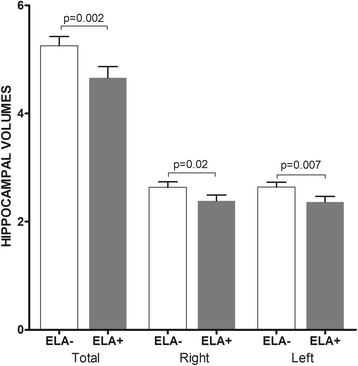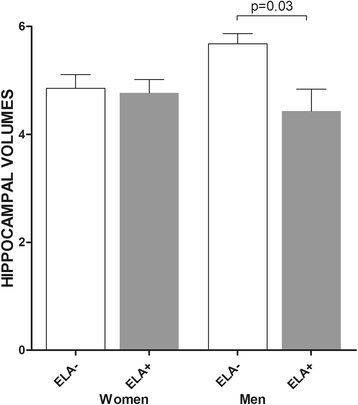Early life adversity is associated with a smaller hippocampus in male but not female depressed in-patients: a case-control study
- PMID: 28202012
- PMCID: PMC5312536
- DOI: 10.1186/s12888-017-1233-2
Early life adversity is associated with a smaller hippocampus in male but not female depressed in-patients: a case-control study
Abstract
Background: Three studies assessed the association of early life adversity (ELA) and hippocampal volumes in depressed patients, of which one was negative and the two others did not control for several potential confounding variables. Since the association of ELA and hippocampal volumes differ in male and female healthy volunteers, we investigated the association of ELA and hippocampal volumes in depressed patients, while focusing specifically on sex and controlling for several relevant socio-demographic and clinical variables.
Methods: Sixty-three depressed in-patients treated in a psychiatric setting, with a current Major Depressive Episode (MDE) and a Major Depressive Disorder (MDD) were included and assessed for ELA. Hippocampal volumes were measured with brain magnetic resonance imaging (MRI) and automatic segmentation. They were compared between patients with (n = 28) or without (n = 35) ELA. After bivariate analyses, multivariate regression analyses tested the interaction of sex and ELA on hippocampal volume and were adjusted for several potential confounding variables. The subgroups of men (n = 26) and women (n = 37) were assessed separately.
Results: Patients with ELA had a smaller hippocampus than those without ELA (4.65 (±1.11) cm3 versus 5.25 (±1.01) cm3), bivariate: p = 0.03, multivariate: HR = 0.40, 95%CI [0.23;0.71], p = 0.002), independently from other factors. This association was found in men (4.43 (±1.22) versus 5.67 (±0.77) cm3), bivariate: p = 0.006, multivariate HR = 0.23, 95%CI [0.06;0.82], p = 0.03) but not in women.
Conclusion: ELA is associated with a smaller hippocampus in male but not female depressed in-patients. The reasons for this association should be investigated in further studies.
Keywords: Automated segmentation; Early life adversity; Hippocampal volume; MRI; Major depressive disorder; Major depressive episode; Sex.
Figures


Similar articles
-
Depressed suicide attempters have smaller hippocampus than depressed patients without suicide attempts.J Psychiatr Res. 2015 Feb;61:13-8. doi: 10.1016/j.jpsychires.2014.12.010. Epub 2014 Dec 24. J Psychiatr Res. 2015. PMID: 25555305
-
Effects of early life adversity and FKBP5 genotype on hippocampal subfields volume in major depression.J Affect Disord. 2019 Jun 1;252:152-159. doi: 10.1016/j.jad.2019.04.054. Epub 2019 Apr 9. J Affect Disord. 2019. PMID: 30986730
-
Hippocampal volume predicts antidepressant efficacy in depressed patients without incomplete hippocampal inversion.Neuroimage Clin. 2016 Apr 27;12:949-955. doi: 10.1016/j.nicl.2016.04.009. eCollection 2016. Neuroimage Clin. 2016. PMID: 27995060 Free PMC article.
-
Subgenual anterior cingulate cortex and hippocampal volumes in depressed youth: The role of comorbidity and age.J Affect Disord. 2016 Jan 15;190:726-732. doi: 10.1016/j.jad.2015.10.064. Epub 2015 Nov 12. J Affect Disord. 2016. PMID: 26600415 Review.
-
Global hippocampal atrophy in major depressive disorder: a meta-analysis of magnetic resonance imaging studies.Trends Psychiatry Psychother. 2018 Oct-Dec;40(4):369-378. doi: 10.1590/2237-6089-2017-0130. Epub 2018 Sep 17. Trends Psychiatry Psychother. 2018. PMID: 30234890
Cited by
-
The Impact of Stress and Major Depressive Disorder on Hippocampal and Medial Prefrontal Cortex Morphology.Biol Psychiatry. 2019 Mar 15;85(6):443-453. doi: 10.1016/j.biopsych.2018.09.031. Epub 2018 Oct 10. Biol Psychiatry. 2019. PMID: 30470559 Free PMC article. Review.
-
Structural brain correlates of childhood trauma with replication across two large, independent community-based samples.Eur Psychiatry. 2023 Jan 26;66(1):e19. doi: 10.1192/j.eurpsy.2022.2347. Eur Psychiatry. 2023. PMID: 36697368 Free PMC article.
-
Behavioral and structural adaptations to stress.Front Neuroendocrinol. 2018 Apr;49:106-113. doi: 10.1016/j.yfrne.2018.02.002. Epub 2018 Feb 5. Front Neuroendocrinol. 2018. PMID: 29421158 Free PMC article. Review.
-
Inhibition of the Microglial Phagocytic Receptor MerTK Underlies ELA-induced Changes in Synapses and Behavior in Male Mice.bioRxiv [Preprint]. 2025 Jul 20:2025.07.18.665641. doi: 10.1101/2025.07.18.665641. bioRxiv. 2025. PMID: 40791556 Free PMC article. Preprint.
-
Sex differences in hippocampal cognition and neurogenesis.Neuropsychopharmacology. 2019 Jan;44(1):200-213. doi: 10.1038/s41386-018-0208-4. Epub 2018 Sep 7. Neuropsychopharmacology. 2019. PMID: 30214058 Free PMC article. Review.
References
-
- Li M, D’Arcy C, Meng X. Maltreatment in childhood substantially increases the risk of adult depression and anxiety in prospective cohort studies: systematic review, meta-analysis, and proportional attributable fractions. Psychol Med. 2016;46(4):717–730. doi: 10.1017/S0033291715002743. - DOI - PubMed
MeSH terms
LinkOut - more resources
Full Text Sources
Other Literature Sources

